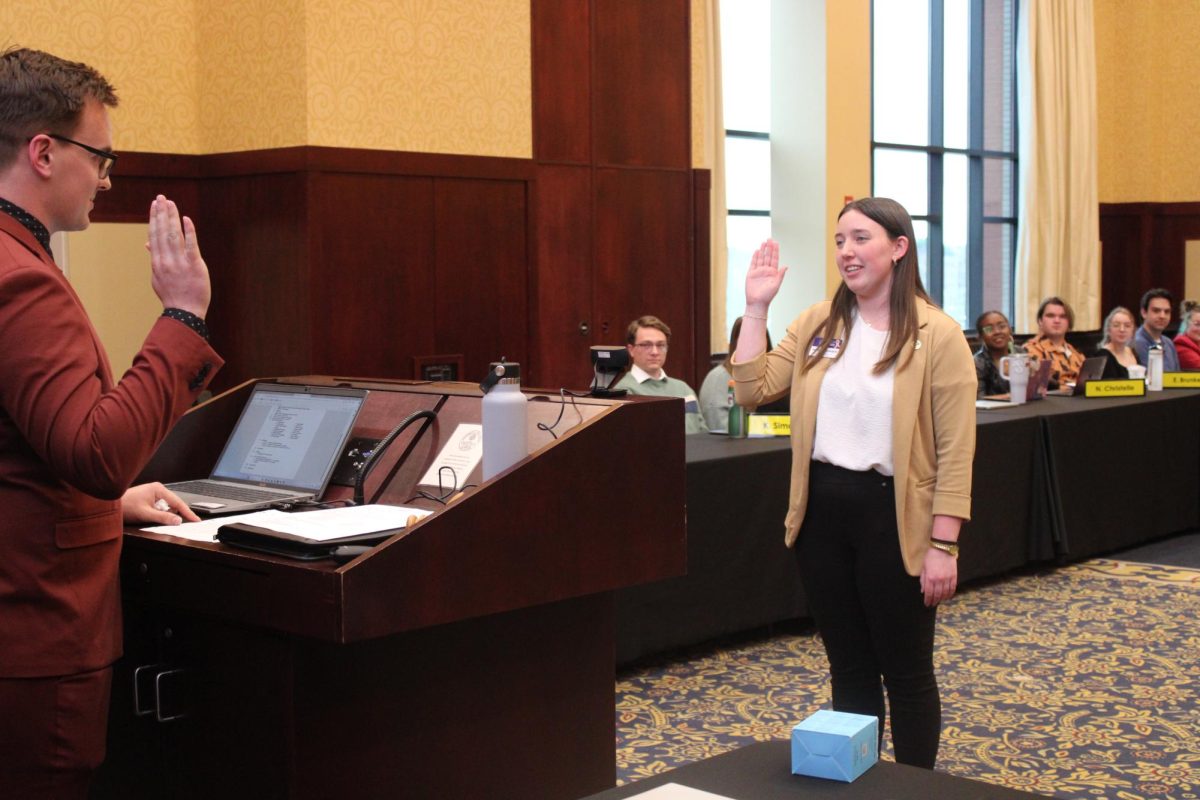Next year’s University Catalogue will see several changes after motions altering three major emphases unanimously passed at Tuesday’s University Senate meeting.
The current German liberal arts major will be renamed as German, liberal arts emphasis, and a new emphasis will be added: German, liberal arts – business/professions emphasis.
The change comes due to student interest and as part of an ongoing curriculum reform in German.
“We would like to give students the option of focusing more on the job-related, practical side of language use and have this be officially reflected in the title of the student’s major upon graduation,” Martina Lindseth, associate professor of German, wrote in the proposal to Senate.
Lindseth emphasizes that they will not be teaching business content but rather the business language.
“It’s still within the liberal arts, but it also focuses on the practical application side of language for a future career,” Lindseth said.
The type of job one gets upon graduation will depend on his or her major, or other major, Lindseth said. Courses will emphasize job application skills, such as telephone translation.
Students also will benefit from business German certification.
Requirements of the business/professions emphasis major include completing an internship in a German speaking country (Foreign Language 275), two business German classes (German 315/316) and an introduction to translation (German 358).
Another department seeing additions to its degree offerings is history. Senate approved a new History, liberal arts, public history emphasis, which goes along with the introduction of two new courses in public history.
According to the motion, public history refers to the theory and practice of a variety of history-related pursuits that occur outside the university setting, and is a growing field in the history discipline.
“It’s a very exciting field that has really exploded in the last 20 to 25 years,” Associate professor of history Patricia Turner said.
More than 100 U.S. universities and colleges offer courses in public history, according to the motion.
“Compared to the other undergraduate emphases in public history in the UW System, this will be the most substantial program – that we know of,” Turner said. “And it will also have a graduate certificate, so that will tie in nicely with our graduate program in public history.”
The new emphasis will prepare students for a wide range of career options, including work in historic preservation, museums, archives, cultural resource management, contract history and other occupations in both the private sector and for government agencies, according to the motion.
Turner said the department has long-standing internship programs available to students, both paid and unpaid, that will really give students credentials.
For students who don’t want to go into teaching or on to grad school, Turner said, this emphasis is a way they can pursue history and work professionally in the field.
Specific requirements include: an introduction to public history course, seminar in public history, fulfillment of a history internship and a capstone project targeted toward a public audience.
Senate’s final curriculum change deleted the kinesiology emphases for exercise management and exercise science, added a new human performance emphasis and renamed the existing movement science emphasis to movement studies.
By creating the human performance emphasis, students can select from four different tracks based on their interests, said Marilyn Skrivseth, department chair of kinesiology and athletics.
This will allow the department to better manage its resources and provide better service to its students, she said.
The four tracks students will be able to choose from are sport performance, fitness management, health promotion and pre-professional.
Additionally, the new emphasis would allow the department to seek program accreditation through the American College of Sports Medicine.
The new plan will decrease enrollment in kinesiology programs. While about 190 students are enrolled in the two deleted emphases programs, which are designed to serve a maximum of 120 students, the new merged emphasis will be able to serve approximately 140 students, according to the motion.
The motion also states “35 students will be admitted into the human performance program each year with any additional enrollment based on course availability.”
“All in all we think this is a win-win situation,” Skrivseth said.
“It’s a better option for students in the long run than our exercise management and exercise science (emphases),” Skrivseth said. “I don’t think anyone of us dreamt these two programs would take off like they did.”






